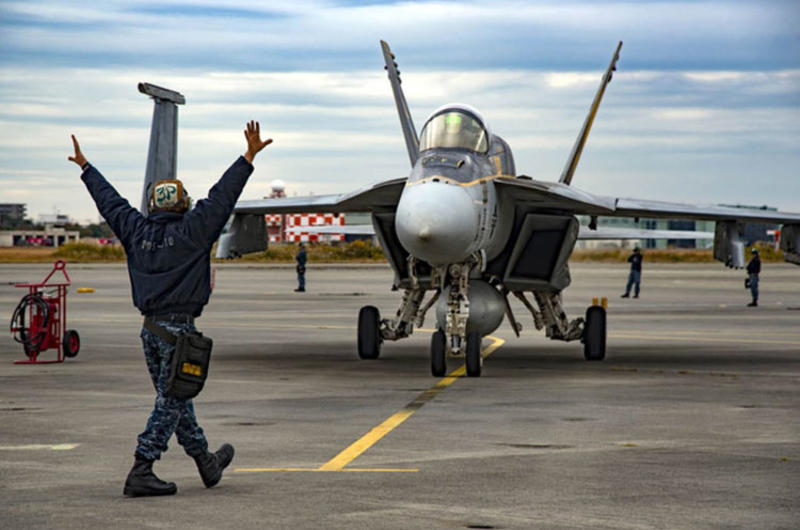Court ruling reverses ban on Atsugi’s Japan Self Defense Forces night flights

An F/A-18E Super Hornet attached to the Eagles of Strike Fighter Squadron 115 taxis at Naval Air Facility Atsugi, Japan, on Nov. 16, 2016.
By ERIK SLAVIN AND HANA KUSUMOTO | Stars and Stripes December 8, 2016
TOKYO — The Japan Supreme Court on Thursday rejected a lower-court ruling banning Japan Self-Defense Forces nighttime flights out of Naval Air Facility Atsugi and reduced compensation for noise, while also allowing late U.S. military flights to continue.
The ruling means JSDF flights can resume from 10 p.m. through 6 a.m., according to parties involved in the decision.
Last year, the Tokyo High Court awarded about $72 million in compensation to more than 7,000 residents living near Atsugi for noise created by U.S. Navy and JSDF aircraft.
The 8.2 billion in compensation wasn’t appealed. However, the high court also provided for 1.2 billion yen (about $10.6 million) compensation for noise expected to continue through the end of this year, which the supreme court rejected Thursday.
The added compensation was supposed to end by the end of this year, after which the Navy’s aircraft were projected to move to Marine Corps Air Station Iwakuni in Japan’s southwest.
The Navy move, once slated for 2014, is now scheduled for an indefinite date in 2017.
The Japanese government had appealed to the supreme court over the flight ban and future compensation ruling, while the residents appealed, seeking tighter restrictions.
The plaintiffs sought an 8 p.m. to 8 a.m. ban on JSDF flights.
The residents also continued to argue for a U.S. flight ban at night, which successive courts ruled was outside of their jurisdiction due to the status of forces agreement.
Few legal analysts expected the court to bar U.S. flights, a position that frustrated Tokio Kaneko, leader of the residents’ group.
“We don’t know what to do when Japanese courts can’t stop something that endangers residents’ lives,” Kaneko said during a phone call prior to Thursday’s ruling.
Although Carrier Air Wing 5’s move to Iwakuni should substantially lessen aircraft noise at the base, Kaneko remained concerned that U.S. jets would still use Atsugi for refueling and other tasks.
The group is considering filing another lawsuit over U.S. flight noise, Kaneko said, following the ruling.
U.S. Naval Forces Japan was not party to the ruling and therefore had no comment on the decision. However, officials noted they restrict flights during Japanese holidays, cultural events and school-exam days.
“The Navy does its best to balance training requirements with local sensitivities,” officials said a statement Thursday.



